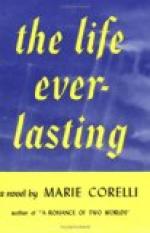Still I could not speak.
“Sometimes it happens”—he continued, in a voice that trembled a little—“that two people who are not immediately conscious of having met before, feel on first introduction to each other as if they were quite old friends. Is it not so?”
I murmured a scarcely audible assent.
He bent his head and looked at me searchingly,—a smile was on his lips and his eyes were full of tenderness.
“Till to-morrow is not long to wait,”—he said—“Not long—after so many years! Good-night!”
A sense of calm and sweet assurance swept over me.
“Good-night!” I answered, with a smile of happy response to his own--"Till to-morrow!”
We were close to the gangway where the others already stood. In another couple of minutes he had made his adieux to our whole party and was on his way back to his own vessel. The boat in which he sat, rowed strongly by our men, soon disappeared like a black blot on the general darkness of the water, yet we remained for some time watching, as though we could see it even when it was no longer visible.
“A strange fellow!” said Dr. Brayle when we moved away at last, flinging the end of his cigar over the yacht side—“Something of madness and genius combined.”
Mr. Harland turned quickly upon him.
“You mistake,”—he answered—“There’s no madness, though there is certainly genius. He’s of the same mind as he was when I knew him at college. There never was a saner or more brilliant scholar.”
“It’s curious you should meet him again like this,”—said Catherine--"But surely, father, he’s not as old as you are?”
“He’s about three and a half years younger—that’s all.”
Dr. Brayle laughed.
“I don’t believe it for a moment!” he said—“I think he’s playing a part. He’s probably not the man you knew at Oxford at all.”
We were then going to our cabins for the night, and Mr. Harland paused as these words were said and faced us.
“He is the man!”—he said, emphatically—“I had my doubts of him at first, but I was wrong. As for ‘playing a part,’ that would be impossible to him. He is absolutely truthful—almost to the verge of cruelty!” A curious expression came into his eyes, as of hidden fear. “In one way I am glad to have met him again—in another I am sorry. For he is a disturber of the comfortable peace of conventions. You”—here he regarded me suddenly, as if he had almost forgotten my presence—“will like him. You have many ideas in common and will be sure to get on well together. As for me, I am his direct opposite,—the two poles are not wider apart than we are in our feelings, sentiments and beliefs.” He paused, seeming to be troubled by the passing cloud of some painful thought—then he went on— “There is one thing I should perhaps explain, especially to you, Brayle, to save useless argument. It is, of course, a ’craze’—but craze or not, he is absolutely immovable on one point which he calls the great Fact of Life,—that there is and can be no Death,—that Life is eternal and therefore in all its forms indestructible.”




